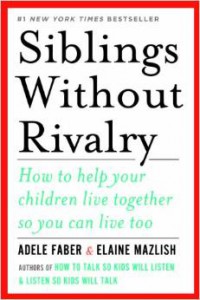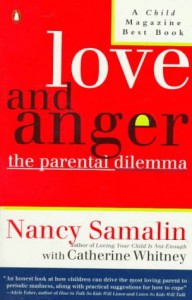It is natural for our children to feel anger toward their siblings and to experience anger in their peer relationships. It is how we react to their anger in these situations that will determine the outcome of how well they manage these angry outbursts.
 The book, Siblings Without Rivalry, goes in depth about sibling conflict. As we learned during the API Reads discussion of this book, the author recommends allowing the siblings to problem-solve the matters themselves without your intervention, unless of course the interaction is physical and then separation is needed. It is also beneficial to reflect back to each child what their feelings are so that the other child “hears” the emotions. This book touches on the fact that no matter what you do as parents, your children are going to feel jealous or that things are unfair sometimes.
The book, Siblings Without Rivalry, goes in depth about sibling conflict. As we learned during the API Reads discussion of this book, the author recommends allowing the siblings to problem-solve the matters themselves without your intervention, unless of course the interaction is physical and then separation is needed. It is also beneficial to reflect back to each child what their feelings are so that the other child “hears” the emotions. This book touches on the fact that no matter what you do as parents, your children are going to feel jealous or that things are unfair sometimes.
The peer relationship is one in which you want to remain empathetic to what is going on but to not take sides. You want to help your child problem-solve on his or her own about what is needed to be done. Your role is mainly to be a sounding board.
 Here are some portions from the API Reads discussion on Love and Anger that I highlighted as points to remember in regards to sibling rivalry:
Here are some portions from the API Reads discussion on Love and Anger that I highlighted as points to remember in regards to sibling rivalry:
- Parents have a right to want to discourage cruelty. But at the same time, they need to accept the fact that they won’t always be able to make their children kind to one another. Sibling rivalry drives parents crazy, but it is a natural state of affairs.
- Children will fight no matter what and their arguing is inevitable. However, do not take sides. Firmly state the rule without blaming either child.
- As children grow up and reach adulthood, the hostility and competition usually lessen and are gradually replaced by closeness and support.
- Parents need to accept the feelings of jealousy, resentment or anger that a sibling might have, while setting limits on hurtful actions. “Sometimes Jeffrey annoys you. I know. But he’s not to be hit.”
- Sometimes it’s helpful to indulge your children’s fantasies about a sibling.
- Parents have to accept the fact that children won’t always perceive their actions as being fair.
 I know for myself that siblings do tend to create connection when they are older. There was competition, jealousy, cruelty, tattle-tailing and so on in the sibling relationships I grew up with, but now we support one another as adults.
I know for myself that siblings do tend to create connection when they are older. There was competition, jealousy, cruelty, tattle-tailing and so on in the sibling relationships I grew up with, but now we support one another as adults.
Editor’s note: Join this and other discussions on Goodreads through the API Reads online book club. You can read along in your own copy of Love and Anger, or even if you don’t have the book, you can follow the discussion and take away bits of parenting ideas to try in your home. Learn more about the API Reads program or join for free directly at Goodreads.
